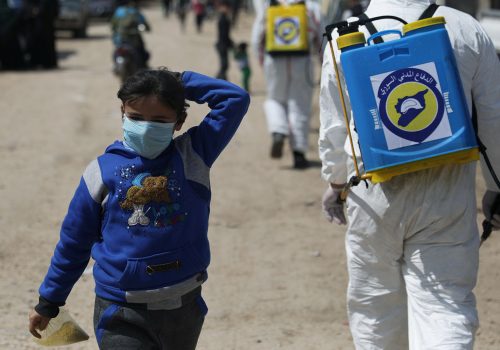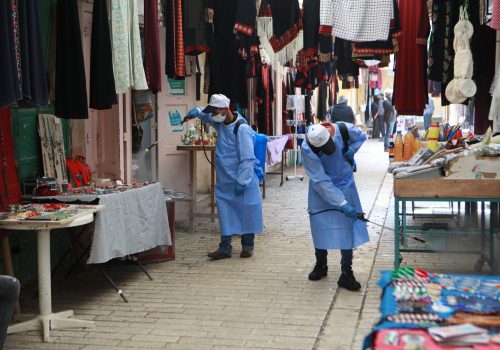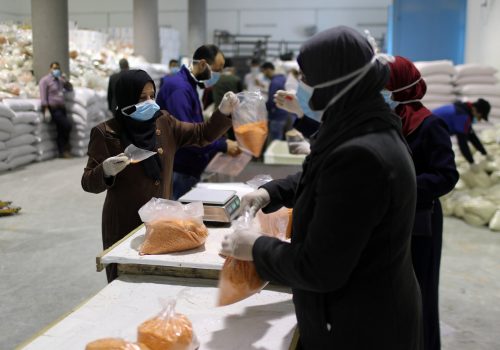Oman’s handling of the coronavirus
Muscat is very quiet two weeks after stepped up efforts to prevent the spread of COVID-19 by the newly formed Supreme Committee. Oman acted early and barred entry to travelers from China, South Korea, Iran and Italy on March 2, but government calls for social distancing were not having the desired effect. Days later, the government restricted entry to only Omani citizens and legal residents. This decision was followed by requiring everyone returning from abroad to self-quarantine for 14 days, and finally, the shutting down of all commercial flights on March 29 (with the exceptions of flights to and from the Musandam Governorate, which is surrounded by UAE territory).
During the week of March 15, the Supreme Committee announced that all government offices would go to 30 percent staffing. They also announced the closure of schools, most shops and malls, except for supermarkets and banks, while restaurants are only offering take-away. Some large supermarket chains supposedly offer home delivery, but experience has been that online orders are almost impossible to place, and delivery is only offered after five days. Gatherings in public places are banned.
Last week, on March 25, Sultan Haitham chaired a session of the Supreme Committee and then announced a personal donation of about $26 million. In the same vein, Oman’s larger banks have established mechanisms for private donations to the health ministry’s efforts and several banks made their own donations. The Central Bank has also announced funds to shore up the banking sector and the government announced an array of measures to reduce the burden on businesses, including deferment of municipal taxes and rents for factories in industrial zones among other measures.
The results appear to be impressive: as of April 1, the number of cases reported in Oman is 210, with only one death. On the same day, the administrative district of Matrah was completely closed due to indications of “social transmission” of the virus in that area among people who had not traveled abroad. Matrah Wilaya includes some of greater Muscat’s best-known tourist attractions including Matrah Port, Matrah Suq, the National Museum among other well-known spots.
Also on April 1, the Supreme Committee and Royal Oman Police announced the establishment of checkpoints on roads connecting Oman’s governorates. The checkpoints are manned jointly by the police and the army who are enforcing instructions to limit ground travel between regions to emergency personnel and those transporting necessities such as food. The Royal Oman Police also reported that several citizens had been called in for questioning and possible prosecution for spreading false information through social media accounts.
Instead of ring tones, cell phone calls play a message in Arabic and English continuously reminding residents to stay home.
Supermarkets are well stocked and the public so far appears to be understanding and supportive of the government’s efforts, but the economic cost is large and growing. Oman is vulnerable to oil price shocks, and the combination of the coronavirus outbreak and the ongoing oil price dispute between Saudi Arabia and Russia will stress the economy and government finances. Health Minister Ahmed Al-Saidi gave an interview on March 29 in which he stressed the importance of social distancing and staying home as much as possible. He noted that it is impossible to predict how long it will take to control coronavirus.
While Oman is bogged down with preventing the spread of COVID-19, something to watch is China’s growing soft power in Muscat and across the region. The Royal Air Force of Oman has now conducted two special flights of transport aircraft to China to bring back medical supplies and equipment, with the second flight heavily covered in state media. At the same time, state media is reporting the rapid increase in infections and deaths in the United States, while noting China’s success in bringing the virus under control.
While Omanis are aware of COVID-19’s origin in Wuhan and may know about China’s early efforts to suppress information about the outbreak, at this point Beijing is offering assistance and posing as a model for controlling the spread while the US is focused on its own public health crisis. China’s ability to offer equipment is clearly a small part of the worldwide Chinese effort to project a positive image.
Oman appears to be managing the spread of coronavirus effectively, so far at least with the lowest numbers of deaths and infected persons in the Gulf. Testing is also ramping up, and the controls imposed between regions and the sustained messaging of the public to stay home and maintain social distancing are also likely to produce positive results, especially since over half the number of total cases are within the greater Muscat area.
More weeks of strictly controlled movement and closure of much of the economy will no doubt be painful, but the view here is that controlling the spread of the virus and protecting public health are the highest priorities.
Ambassador Marc J. Sievers is a senior nonresident fellow at the Atlantic Council’s Middle East Programs. He retired in December 2019 as a career member of the senior foreign service. His most recent posting was as US Ambassador to Oman from January 2016 until December 2019.
Image: General view of old Muscat on January 12, 2020 (Reuters)


